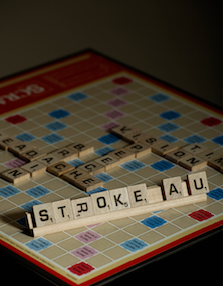
Boone’s Multidisciplinary Team Helps Save Centralia Woman From Stroke
By: Jacob Luecke
Each week, Sandra and David Eppinger get together with Sandra’s sister for a game of Scrabble. Competing in a game like Scrabble requires knowing thousands of words. Strong spelling and lexical creativity will also give you an edge.
Yet one day, as Sandra, 75, showered before her sister arrived for the game, all her words suddenly disappeared. However, that wasn’t the first thing she noticed.
“My left hand went dead,” she says. “It was just dead; it felt like wood. I knew then what was happening.”
Sandra was having a stroke.
With the left side of her body going limp, Sandra carefully got out of the shower and went to her bedroom where she called her husband for help. At least she tried to — the words weren’t coming out. Instead of talking, it was like she was spilling a bag of jumbled Scrabble tiles across the floor.
“My speech was totally garbled, my husband couldn’t understand what I was saying,” she says.
Luckily, her husband knew to call for help — 911. He also called Sandra’s sister to let her know the Scrabble game would have to be postponed.
Soon, an ambulance had reached the Eppingers’ Centralia home. Sandra was quickly on her way to Boone Hospital’s leading Stroke Center with a multidisciplinary team of highly trained staff and experienced physicians.
As a registered nurse who retired from Boone Hospital in 2002, Sandra was very familiar with what was happening to her and worried about how her stroke might alter her life. During her nursing career, she had cared for stroke patients before modern stroke treatments were available. She had seen firsthand how a stroke can immediately and permanently change a person’s abilities.
“I know what can happen,” she says.
While Sandra was being driven to the hospital, the Boone Hospital Stroke Center team was already preparing to care for her.
“This saves valuable time,” says Robert McEver, service line director for Boone Hospital’s Medical Neuroscience Specialties. “During transport, we will call the neurologist and have
them available either in person or by phone to assist with the management of the patient.”
The staff and physicians at the stroke center do everything possible to deliver the clot-busting drug tPA as fast as they can. They know that every moment is critical during a stroke; nearly two million of the patient’s neurons die every minute the stroke is left untreated.
Before giving Sandra the tPA, the caregivers needed to do a CT scan to confirm her stroke was caused by a blood clot. They made sure the CT scanner was available and ready for Sandra as soon as she arrived. Her CT scan confirmed she was having a stroke.
“Sandra had a right temporal lobe stroke,” says Sandra’s neurologist, Dr. Allyn Sher, MD, with Neurology Incorporated. “Potentially, the stroke could have left her with severe weakness and neglect of the left side and partial visual loss. She received tPA rapidly and had minimal-to- no functional loss when she left the hospital. The benefit of going straight to CT is that it saves time. Time is brain. Every minute that treatment is delayed, cells die. Since this saves time, it increases the chance that a stroke patient will have a good outcome.”
Soon after she received the tPA, Sandra’s condition began to improve.
“By the time I left the Emergency Department, they could manage to understand what I was saying,” she says.
Sandra spent four days at Boone Hospital — two days in the Intensive Care Unit and two on the hospital’s Neurology unit. She says she was very impressed with Dr. Sher and the hospital’s staff.
“Everyone that came in was so cheerful and smiling,” she says.
She also enjoyed staying in the hospital’s expanded and renovated private rooms.
“It’s fantastic, it’s really nice,” she says.
During her stay, she had regular visits with the hospital’s inpatient physical, occupational and speech therapy staff members. However, her abilities came back so well that she did not need to continue with therapy outside the hospital.
Stroke team members say Sandra’s quick recognition of her stroke and her husband’s timely decision to call 911 played a key role in her positive outcome. They also say Boone Hospital’s stroke team enjoys collaborating together with a focus on doing everything possible to help their patients.

“Our stroke team is multidisciplinary,” says Donna Pond, coordinator of Boone Hospital Stroke Center. “The members of the team have expertise that is applicable to every stage of the stroke patient’s recovery. The team stays in communication throughout the stay, and all eyes are on the patient and meeting the best care practices.”
McEver agrees. “We have a great team,” he says. “Working together with the patient as the central focus helps bring the best care possible. Everyone knows their job, and they have the trust of the other caregivers.”
Today, Sandra is back to her normal routine, including her regular Scrabble games. However, that’s only one of her many activities, which include jewelry making, knitting, crocheting, needlepoint, gardening and volunteering at the Centralia Senior Citizen Center.
“We keep busy,” she says with a laugh.
She encourages everyone to become familiar with the common stroke symptoms and to call 911 as quickly as possible. “The faster they can get there, the faster they can get the tPA, and the faster they can pull out of it,” she says.